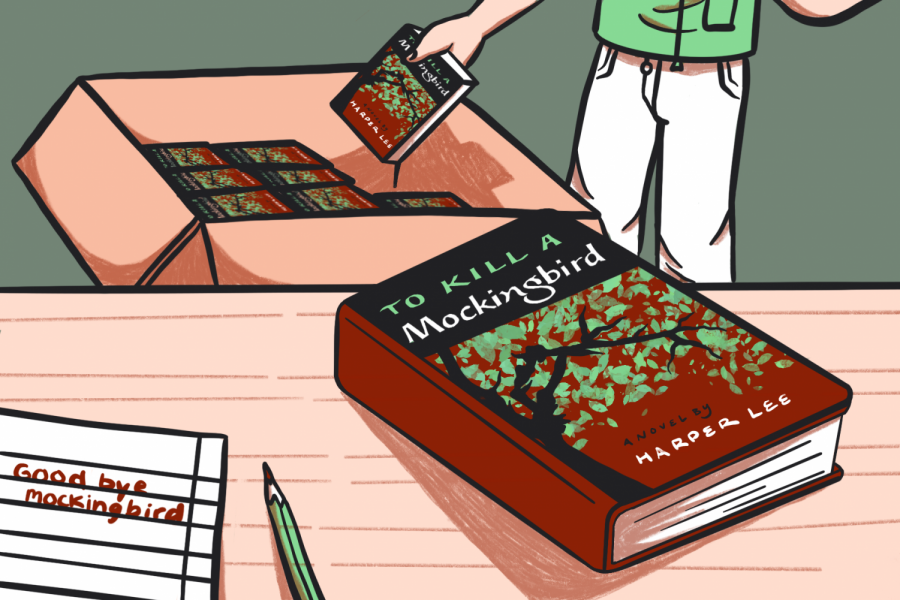English Dept. set to remove ‘To Kill a Mockingbird’ from curriculum
The English Department is currently seeking a replacement for Harper Lee’s “To Kill a Mockingbird” in its freshman Survey of Composition and Literature course.
The English Department is set to replace the freshman course reading “To Kill a Mockingbird” (“TKAM”) next school year. Working with the Mountain View–Los Altos School District, the department will finalize the replacement later in the semester.
Los Altos High School English teachers have discussed and sought a “TKAM” replacement since the 1990s, but until now, the book has remained a core text for the Survey of Composition and Literature class, namely because of its lessons on empathy, race and prejudice both in the context of the novel and modern-day society.
Set in the 1930s, the story centers on Atticus Finch, a white lawyer who defends a Black man wrongfully accused of rape in court.
The Survey team has taught the novel in past years by emphasizing the book’s central themes — such as empathy, power and courage — through Socratic dialogue and quizzes. For a final essay, students typically choose one or more of these themes to focus on and write about.
However, teachers and students have faced growing concerns with the novel’s place in the Survey curriculum. English Department Coordinator Margaret Bennett cited the novel’s difficulty and its “outdated messages having to do with race and the status quo” as reasons for its removal.
“Many experts agree that depicting Atticus as a white savior is problematic,” Bennett said. “And, arguably few, if any of the Black characters are developed in the novel.”
According to junior Taylor Nguyen, the story doesn’t fully capture the racism experienced by its Black characters; the novel was written by a “privileged” white author more than 50 years ago.
“I just have a problem that you don’t get a true sense if the novel wasn’t written by a Black woman,” Taylor said. “The fact that you don’t get that gives this lack of sincerity in the book.”
Some students, however, don’t agree with the department’s decision. Sophomore Keira Chatwin believes that while Atticus may have been portrayed as a “white savior,” it didn’t take away from the book’s central message.
“I don’t think what someone is going to pull from the novel is, ‘We should go save Black people!’” Keira said. “There are better messages of imbalanced power systems and empathy. I would even say that this contextualization of racial injustice in America provides good background and knowledge of history and how race relations have developed throughout time.”
However, Keira did suggest that she would be open to other novels that portray the same messages from “TKAM” in a “more accurate way.”
For others, the issue with “TKAM” isn’t with the book itself, but rather with how it’s being taught. Senior Zain Merchant insisted that dropping the book was drastic and unnecessary.
“A better option is to teach the book a little bit differently and slightly change the curriculum,” Zain said. “Have a week-long discussion on why this book matters today; talk about cases that have been going on in the past two years and how it relates to today. I think there are other actions that can be taken that can help ninth graders be more interested in the book.”
Sophomore Shaurya Kadiyala said he thought the English department did a poor job of teaching the novel to students by focusing too heavily on central themes and failing to give attention to its real-world impacts and modern significance.
“I think this detracted from the actual messages about racism and prejudice within the book,” Shaurya said. “Because of this, ‘TKAM’ in the current Survey curriculum is useless and might as well be any storybook.”
While some are unhappy with the removal, the English department is ultimately looking to find a suitable replacement that will benefit students down the road and are currently exploring a number of possible texts.
Taylor suggested alternatives including Angie Thomas’s “The Hate U Give” and Lawrence Hill’s “The Book of Negroes” citing the fact that the books are written by Black authors and address modern-day racial issues, including police brutality.







Elizabeth Blavatsky | Nov 18, 2020 at 10:16 pm
Although TKAM is an outdated and out of tone novel racially, I believe that the story it tells is more centered around how people should learn to accept others for what they are and that the world isn’t perfect.
Mr. Somich | Oct 26, 2020 at 3:55 pm
This is terrific reporting! Very objective and informative!
Mr. Somich
Mayfield High School
Mayfield Village, OH